Premium Only Content
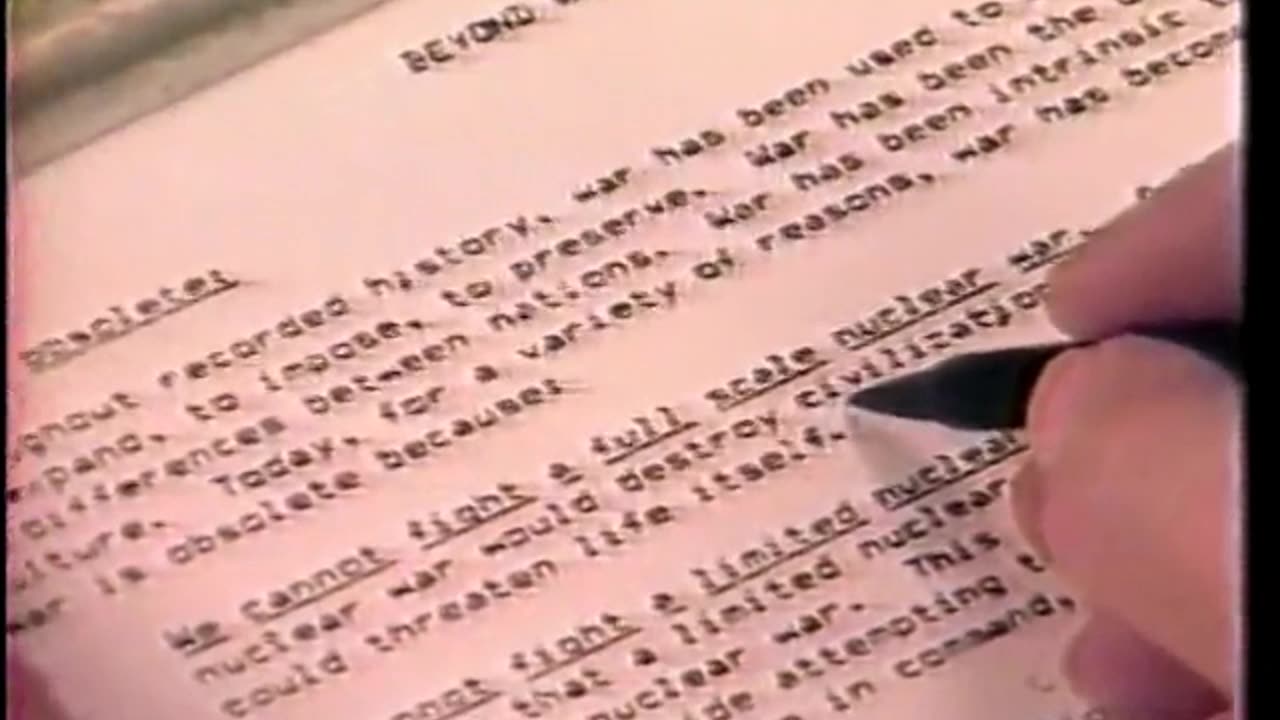
How You Get Tricked Into Supporting War (1987)
The dark side of history: https://thememoryhole.substack.com/
William Ramsey Clark (December 18, 1927 – April 9, 2021) was an American lawyer, activist, and federal government official. A progressive, New Frontier liberal,[1] he occupied senior positions in the United States Department of Justice under Presidents John F. Kennedy and Lyndon B. Johnson, serving as United States Attorney General from 1967 to 1969; previously, he was Deputy Attorney General from 1965 to 1967 and Assistant Attorney General from 1961 to 1965.
As attorney general, Clark was known for his vigorous opposition to the death penalty, aggressive support of civil liberties and civil rights, and dedication to enforcing United States antitrust laws.[2] Clark supervised the drafting of the Voting Rights Act of 1965 and Civil Rights Act of 1968.
After leaving public office, Clark led many progressive activism campaigns, including opposition to the War on Terror. He offered advice or legal defense to such prominent figures as Charles Taylor, Slobodan Milošević, Saddam Hussein, Colonel Muammar Gaddafi, and Lyndon LaRouche.[3] Until his death in 2021, Clark was the last surviving member of the cabinet of Lyndon B. Johnson.[4]
Early life and career
Clark was born in Dallas, Texas, on December 18, 1927,[5] the son of jurist Tom C. Clark and his wife Mary Jane (née Ramsey). Clark's father served as United States Attorney General from 1945 to 1949 under President Harry S. Truman and then became a Supreme Court Justice in August 1949.[6] His maternal grandfather was William Franklin Ramsey, who served on the Supreme Court of Texas,[7][8] while his paternal grandfather, lawyer William Henry Clark, was president of the Texas Bar Association.[7]
Clark attended Woodrow Wilson High School in Washington, D.C., but dropped out at the age of 17 in order to join the United States Marine Corps, seeing action in Western Europe in the final months of World War II;[7] he served until 1946. Back in the U.S., he earned a Bachelor of Arts from the University of Texas at Austin in 1949, and obtained a Master of Arts in American history from the University of Chicago and a Juris Doctor from the University of Chicago Law School in 1950 and 1951, respectively.[9] While at the University of Texas, he was a member of the Delta Tau Delta fraternity.[10]
He was admitted to the Texas bar in 1950, and was admitted to practice before the Supreme Court of the United States in 1956. From 1951 to 1961, Clark practiced law as an associate and partner at his father's Texas law firm, Clark, Reed and Clark.[11]
Kennedy and Johnson administrations
Attorney General Clark and President Lyndon B. Johnson in 1967
In the Kennedy and Johnson administrations, Clark occupied senior positions in the Justice Department; he was Assistant Attorney General, overseeing the department's Lands Division from 1961 to 1965, and then served as Deputy Attorney General from 1965 to 1967.[12]
In 1967, President Lyndon B. Johnson nominated him to be Attorney General of the United States. He was confirmed by the Senate and took the oath of office on March 2. Clark was one of Johnson's popular and successful cabinet appointments, being described as "able, independent, liberal and soft-spoken" and a symbol of the New Frontier liberals;[1] he had also built a successful record, especially in his management of the Justice Department's Lands Division; he had increased the efficiency of his division and had saved enough money from his budget so that he had asked Congress to reduce the budget by $200,000 annually.[1]
However, there also was speculation that one of the reasons that contributed to Johnson's making the appointment was the expectation that Clark's father, Associate Justice Tom C. Clark, would resign from the Supreme Court to avoid a conflict of interest.[13] Johnson wanted a vacancy to be created on the Court so he could appoint Thurgood Marshall, the first African American justice. The elder Clark assumed senior status on June 12, 1967, effectively resigning from the Supreme Court and creating the vacancy Johnson apparently desired.[14]
During his years at the Justice Department, Clark played an important role in the history of the civil rights movement. He:
supervised the federal presence at Ole Miss during the week following the admission of James Meredith;
surveyed all school districts in the South desegregating under court order (1963);
supervised federal enforcement of the court order protecting the 1965 Selma to Montgomery marches;
headed the Presidential task force to Watts following the 1965 riots; and
supervised the drafting and executive role in passage of the Voting Rights Act of 1965 and Civil Rights Act of 1968.[3]
As attorney general during part of the Vietnam War, Clark oversaw the prosecution of the Boston Five for "conspiracy to aid and abet draft resistance." Four of the five were convicted, including pediatrician Dr. Benjamin Spock and Yale chaplain William Sloane Coffin Jr.,[15] but in later years, Clark expressed his regret at the prosecution's victory: "We won the case, that was the worst part."[16]
Clark served as the attorney general until Johnson's term as president ended on January 20, 1969.[17] Because of Richard Nixon's attacks on Clark's liberal record during the 1968 presidential election campaign and ultimate narrow victory over Hubert H. Humphrey, relations between Johnson and Clark soured and, by inauguration day, they were no longer on speaking terms.[15]
In addition to his government work, during this period Clark was also director of the American Judicature Society (in 1963) and national president of the Federal Bar Association in 1964–65.[17]
Private career
Following his term as attorney general, Clark taught courses at the Howard University School of Law (1969–1972) and Brooklyn Law School (1973–1981).[18] He was active in the anti-Vietnam War movement and visited North Vietnam in 1972 as a protest against the bombing of Hanoi.[15] During this time he was associated with the New York law firm Paul, Weiss, Rifkind, Wharton & Garrison, but he resigned in 1973, saying, "I didn't feel like working on things I didn't believe in, I didn't think were important."[19]
On January 28, 1970, Ramsey Clark testified in the Chicago Seven trial. He was barred by Judge Julius Hoffman from testifying before the jury after Clark had testified outside the presence of the jury. Judge Hoffman upheld the prosecution's objections to 14 of Defense Attorney William Kunstler's 38 questions to Clark, but Clark did testify that he had told the prosecutor Tom Foran to investigate the charges against the defendants through Justice Department lawyers "as is generally done in civil rights cases", rather than through a grand jury.[20]
At the 1972 Democratic National Convention, Clark received one delegate vote for the presidential nomination[21] and two delegate votes for the vice-presidential nomination.[22]
In 1974, Clark ran as the Democratic candidate for U.S. Senator from New York; he defeated the party's designee Lee Alexander in the primary, but lost in the general election to the incumbent Jacob Javits. In the 1976 election, Clark again sought the Democratic nomination to represent New York in the Senate, but finished a distant third in the primary behind Daniel Patrick Moynihan and Congresswoman Bella Abzug.[15]
On November 5, 1979, at the start of the Iranian hostage crisis, President Jimmy Carter instructed Clark and Senate staffer William Miller to visit Tehran and seek to open negotiations with Iranian authorities for the hostages' release; while en route, they were refused entry into the country by Ayatollah Khomeini.[23][24] Defying a travel ban, Clark went to Tehran again in June 1980 to attend a conference on alleged U.S. interference in Iranian affairs, on which occasion he was granted admission. While there he both demanded the release of the hostages and criticized past U.S. support for the deposed Shah. This second unauthorized trip reportedly infuriated President Carter.[25][15]
International activism
In 1991, Clark's Coalition to Stop U.S. Intervention in the Middle East opposed the U.S.-led war and sanctions against Iraq.[26] Clark accused the administration of President George H. W. Bush, its officials Dan Quayle, James Baker, Dick Cheney, William Webster, Colin Powell, Norman Schwarzkopf, and "others to be named" of "crimes against peace, war crimes", and "crimes against humanity" for its conduct of the Gulf War against Iraq and the ensuing sanctions;[27] in 1996, he added the charges of genocide and the "use of a weapon of mass destruction".[28] Similarly, after the 1999 NATO bombing of the Federal Republic of Yugoslavia Ramsey charged and "tried" NATO on 19 counts and issued calls for its dissolution.[29]
In September 1998, Clark led a delegation to Sudan to collect evidence in the aftermath of President Bill Clinton's bombing of the Al-Shifa pharmaceutical factory in Khartoum the previous month as part of Operation Infinite Reach. Upon returning to the U.S., the delegation held a press conference on September 22, 1998, to refute the U.S. State Department's claims that the facility had been producing VX nerve agent.[30] U.S. officials later acknowledged that the evidence cited as the rationale for the Al-Shifa strike was weaker than initially believed.[31]
As a lawyer, Clark was criticized by both opponents and supporters for some of the people he agreed to defend, such as foreign dictators hostile to the United States; Clark stood beside and defended his clients, regardless of their own admitted actions and crimes.[32]
In 2004, Clark joined a panel of about 20 Arab and one other non-Arab lawyers to defend Saddam Hussein in his trial before the Iraqi Special Tribunal.[33] Clark appeared before the Iraqi Special Tribunal in late November 2005 arguing "that it failed to respect basic human rights and was illegal because it was formed as a consequence of the United States' illegal war of aggression against the people of Iraq."[34] Clark said that unless the trial was seen as "absolutely fair", it would "divide rather than reconcile Iraq".[35] Christopher Hitchens said Clark was admitting Hussein's guilt when Clark reportedly stated in a 2005 BBC interview: "He [Saddam] had this huge war going on, and you have to act firmly when you have an assassination attempt".[36]
Hitchens continued to describe Clark in the following terms:
"From bullying prosecutor he mutated into vagrant and floating defense counsel, offering himself to the génocideurs of Rwanda and to Slobodan Milosevic, and using up the spare time in apologetics for North Korea. He acts as front-man for the Workers World Party, which originated in a defense of the Soviet invasion of Hungary in 1956."[36]
Sociologist and anti-communist scholar Paul Hollander wrote of Clark:
"It is likely that well before Clark took his bizarre positions in support of highly repressive, violent, and intolerant political systems and their leaders, he came to the conclusion that the United States was the most dangerous and reprehensible source of evil in the world. This overarching belief led to the reflexive sympathy and support for all the enemies and alleged victims of the United States. They include dictators of different ideological persuasion noted above, whose inhumane qualities and policies Clark was unable to discern or acknowledge, let alone condemn. It was sufficient for Clark's moral accounting that if these dictators were opposed to (and allegedly victimized by) the United States, they deserved and earned his sympathy."[37]
Clark was not alone in criticizing the Iraqi Special Tribunal's trial of Saddam Hussein, which drew intense criticism from international human rights organizations. Human Rights Watch called Saddam's trial a "missed opportunity" and a "deeply flawed trial",[38][39] and the UN Working Group on Arbitrary Detention found the trial to be unfair and to violate basic international human rights law.[34] Among the irregularities cited by HRW, were that proceedings were marked by frequent outbursts by both judges and defendants, that three defense lawyers were murdered, that the original chief judge was replaced, that important documents were not given to defense lawyers in advance, that paperwork was lost, and that the judges made asides that pre-judged Saddam Hussein.[40] One of the aforementioned outbursts occurred when Clark was ejected from the trial after passing the judge a memorandum stating that the trial was making "a mockery of justice". The chief judge Raouf Abdul Rahman shouted at Clark, "No, you are the mockery ... get him out. Out!"[41]
On March 18, 2006, Clark attended the funeral of Slobodan Milošević. He commented: "History will prove Milošević was right. Charges are just that: charges. The trial did not have facts." He compared the trial of Milošević with Saddam's, stating "both trials are marred with injustice, both are flawed." He characterized Milošević and Saddam Hussein as "both commanders who were courageous enough to fight more powerful countries."[42]
Ramsey Clark speaks to the anti-war protest in Washington, D.C., on March 20, 2010.
In June 2006, Clark wrote an article criticizing U.S. foreign policy in general, containing a list of 17 U.S. "major aggressions" introduced by "Both branches of our One Party system, Democrat and Republican, favor the use of force to have their way."[a] He followed this by saying, "The United States government may have been able to outspend the Soviet Union into economic collapse in the Cold War arms race, injuring the entire planet in the process. Now Bush has entered a new arms race and is provoking a Second Cold War."[43]
On September 1, 2007, in New York City, Clark called for detained Filipino Jose Maria Sison's release and pledged assistance by joining the latter's legal defense team headed by Jan Fermon. Clark doubted Dutch authorities' "validity and competency", since the murder charges originated in the Philippines and had already been dismissed by the country's Supreme Court.[44]
In November 2007, Clark visited Nandigram in India[45][46] where conflict between state government forces and villagers resulted in the death of at least 14 villagers.[47][48][49] In a December 2007 interview, he described the War on Terror as a war against Islam.[50]
Ramsey Clark visiting Nandigram, India, November 2007
In April 2009, Clark spoke at a session of the UN's anti-racism Durban Review Conference at which he accused Israel of genocide.[51]
In September 2010, an essay on torture by Clark was published in a three-part paperback entitled The Torturer in the Mirror (Seven Stories Press).[52][15]
Clark was a recipient of the 1992 Gandhi Peace Award,[53] and also the Peace Abbey Courage of Conscience Award for his commitment to civil rights, his opposition to war and military spending and his dedication to providing legal representation to the peace movement, particularly, his efforts to free Leonard Peltier.[54] In 1999, he traveled to Belgrade to receive an honorary doctorate from Belgrade University.[55][56]
In 2008, the United Nations awarded him its Prize in the Field of Human Rights for "his steadfast insistence on respect for human rights and fair judicial process for all".[57]
Advocating the impeachment of George W. Bush
See also: Efforts to impeach George W. Bush
VoteToImpeachFounded 2002
Dissolved January 20, 2009
Type Political advocacy
Focus Impeachment of Bush administration members
Location
Washington, D.C.
Area served
United States
Members
Reported over 1,000,000 signatories
Key people
Ramsey Clark (founder)
In 2002, Clark founded "VoteToImpeach", an organization advocating the impeachment of President George W. Bush and several members of his administration. For the duration of Bush's terms in office, Clark sought, unsuccessfully, for the House of Representatives to bring articles of impeachment against Bush. He was the founder of the International Action Center, which holds significant overlapping membership with the Workers' World Party.[58] Clark and the IAC helped found the protest organization A.N.S.W.E.R. (Act Now to Stop War and End Racism).[59]
On March 19, 2003, the New Jersey newspaper and website The Independent reported Clark's efforts to impeach Bush and others, prior to the start of the Iraq War. The paper commented: "Clark said there is a Web site, www.votetoimpeach.org, dedicated to collecting signatures of U.S. citizens who want President George W. Bush impeached, and that approximately 150,000 have signed to impeach, he said."[60] The Weekly Standard magazine stated in an article dated February 27, 2004, "Ramsey Clark's VoteToImpeach.org is a serious operation", and said the group had run full-sized newspaper advertising on both coasts of the U.S. though the Standard also went on to describe them as also being an "angry petition stage."[61]
Clark's speech to a counter-inauguration protest on January 20, 2005, at John Marshall Park in Washington, D.C., was broadcast by Democracy Now in which Clark stated: "We've had more than 500,000 people sign on 'Vote to Impeach'."[62] The San Francisco Bay Guardian listed the website as one of three "Impeachment links", alongside afterdowningstreet.org and impeachpac.org.[63]
The organization, under Clark's guidance, drafted its own articles of impeachment against President Bush, Vice President Richard B. Cheney, Secretary of Defense Donald Rumsfeld, and Attorney General John Ashcroft. The document argues that the four committed, "violations and subversions of the Constitution of the United States of America in an attempt to carry out with impunity crimes against peace and humanity and war crimes and deprivations of the civil rights of the people of the United States and other nations, by assuming powers of an imperial executive unaccountable to law and usurping powers of the Congress, the Judiciary and those reserved to the people of the United States."[64] Votetoimpeach.org claimed to have collected over one million signatures in favor of impeachment as of January 2009.[65]
Notable clients
As a lawyer, Clark also provided legal counsel and advice to prominent figures, including many controversial individuals.[66][67]
Regarding his role as a defense lawyer in the trial of Saddam Hussein, Clark said: "A fair trial in this case is absolutely imperative for historical truth."[68] Clark stated that by the time he decided to join Hussein's defense team, it was clear that "proceedings before the Iraqi Special Tribunal would corrupt justice both in fact and in appearance and create more hatred and rage in Iraq against the American occupation...affirmative measures must be taken to prevent prejudice from affecting the conduct of the case and the final judgment of the court...For there to be peace, the days of victor's justice must end."[69]
A partial listing of persons who have reportedly received legal counsel and advice from Ramsey Clark includes:
Lori Berenson, an American convicted of support of MRTA guerrillas in Peru.[70]
Father Philip Berrigan, a Catholic priest and antiwar activist (one of the Harrisburg Seven). Clark served as defense counsel at trial and won an acquittal.[71]
Young church worker Jennifer Casolo, charged by Salvadoran authorities in 1989 with aiding the Farabundo Marti National Liberation Front. Clark traveled to El Salvador to aid in her defense.[72][73] Casolo was released and deported to the U.S. after 18 days in police detention.[74][75]
Radovan Karadžić, former Bosnian Serb politician. In the 1990s, Clark represented Karadžić in a civil suit brought by Croats and Muslims from the former Yugoslavia who sued Karadžić under the Alien Tort Claims Act of 1789 and Torture Victims Protection Act of 1992 for atrocities and human rights abuses committed during the Bosnian War.[67][76]
About 100 survivors and relatives of the dead members of the Branch Davidian sect, whose Mount Carmel compound besieged by federal agents in a 51-day Waco siege in 1993, resulting in the death of about 80 members. Clark represented the plaintiffs in a suit alleging wrongful death and excessive force, giving an impassioned closing argument in which he called the siege "the greatest domestic law enforcement tragedy in the history of the United States." In a trial in 2000, the jury returned a verdict for the government.[77][78]
"Political-cult guru" Lyndon LaRouche.[79]
Nazi concentration camp commandant Karl Linnas.[80]
Camilo Mejía, a U.S. soldier who deserted his post.[81]
The National Organization for the Reform of Marijuana Laws Advisory Board during the 1970s and early 1980s.[82][83]
American Indian Movement prisoner Leonard Peltier.[84]
Elizaphan Ntakirutimana, a leader in the Rwandan genocide.[85]
Palestine Liberation Organization leaders in a lawsuit brought by the family of Leon Klinghoffer, who was murdered during hijacking of the Achille Lauro.[16]
Nazi War criminal Jakob "Jack" Reimer, charged for the killings of Jews in Warsaw.[86]
Liberian dictator Charles Taylor[3] during his 1985 fight against extradition from the United States to Liberia, Taylor would later be convicted of crimes against humanity.[87]
Civil rights attorney Stephen Yagman,[88] whose disbarment from U.S. federal court was sought based on his harsh criticism of a federal judge, William Duffy Keller, calling him an anti-Semite and saying he had been drunk on the bench. The disbarment never went into effect and later was reversed. [89]
In popular culture
In Aaron Sorkin's 2020 film The Trial of the Chicago 7, Clark was portrayed by Michael Keaton.[90]
Personal life
Clark married Georgia Welch, a classmate from the University of Texas, on April 16, 1949. They had two children, Ronda Kathleen Clark and Tom Campbell Clark II. His wife died on July 3, 2010, at the age of 81.[91][92] His son Tom died from cancer on November 23, 2013.[93] Clark lived in Greenwich Village in New York City, where he died on April 9, 2021, at age 93.[15]
Works
Clark, Ramsey (1970). Crime in America: Observations on Its Nature Causes Prevention and Control. Simon & Schuster. ISBN 978-067120407-5.
— (1974). Crime and Justice. The Great Contemporary Issues. New York: Arno Press. ISBN 978-040504167-9.
— (1992a). The Fire This Time: U.S. War Crimes in the Gulf. Thunder's Mouth Press. ISBN 978-156025047-0.
— (1992b). War Crimes: A Report on U.S. War Crimes Against Iraq. Maisonneuve Press. ISBN 978-094462415-9.
— (1998). Challenge to Genocide: Let Iraq Live. International Action Center. ISBN 978-096569164-2.
— (2000). NATO in the Balkans: Voices of Opposition. International Action Center. ISBN 978-096569162-8.
— (2002a) [First published 1996]. The Impact of Sanctions on Iraq: The Children Are Dying (2nd ed.). World View Forum. ISBN 978-096569163-5.
— (2002b). "Appendix: On the fiftieth anniversary of the Universal Declaration of Human Rights". Acts of Aggression: Policing "Rogue" States. By Chomsky, Noam; Zangana, Haifa. Seven Stories Press. ISBN 978-158322546-2.
—; Doebbler, Curtis (2011). The Iraqi Special Tribunal: An Abuse of Justice [Draft Report] (Report). Lulu.com. ASIN B08KWYBVZ5.
—; Douglass, Frederick; Danticat, Edwidge; Dupuy, Ben; Laraque, Paul (2010). Chin, Pat; Dunkel, Greg; Flounders, Sara; Ives, Kim (eds.). Haiti: A Slave Revolution: 200 Years After 1804 (Updated ed.). Youth & The Military Education Project (US). ISBN 978-097475214-3.
— (2010). "Torture, the Cruelest of All Human Acts, Is a Crime in America". The Torturer in the Mirror. By Reifer, Thomas Ehrlich; Zangana, Haifa (First ed.). Seven Stories Press. ISBN 978-158322913-2.
See also
Biography portal
List of peace activists
Progressive Party (South Korea, 2017)
Notes
Clark's list of "major aggressions" by the United States:
Regime change in Iran (1953), the Shah replacing democratically elected Mossadegh; Eisenhower (R).
Regime change in Guatemala (1954), military government for democratically elected Arbenz; Eisenhower (R).
Regime change in Republic of the Congo (Léopoldville) (1961), assassination of Patrice Lumumba; Eisenhower (R).
The Vietnam War (1959–1975); Eisenhower (R), Kennedy (D), Johnson (D), Nixon (R).
Invasion of the Dominican Republic (1965); Johnson (D).
The Contras warfare against Nicaragua (1981–1988), resulting in regime change from the Sandinistas to corrupt capitalists; Reagan (R).
Attack and occupation of Grenada (population 110,000)(1983–1987); Reagan (R)
Aerial attack on the sleeping cities of Tripoli and Benghazi, Libya, (1986); Reagan (R).
Invasion of Panama (1989–1990), regime change; George H. W. Bush (R).
Gulf War (1991); George H. W. Bush (R)
"Humanitarian" occupation of Somalia (1992–1993), leading to 10,000 Somali deaths; George H. W. Bush (R) and Clinton (D).
Aerial attacks on Iraq (1993–2001); Bill Clinton (D)
War against Yugoslavia (1999), 23,000 bombs and missiles dropped on Yugoslavia; Clinton (D).
Missile attack in Khartoum (1998), (21 Tomahawk Cruise Missiles) destroying the Al-Shifa pharmaceutical factory which provided the majority of all medicines for Sudan; Clinton (D).
Invasion and occupation of Afghanistan (2001–present), regime change; George W. Bush (R).
War of aggression against Iraq and hostile occupation (2003–present); George W. Bush (R).
Regime change in Haiti (2004), deposing the democratically elected Aristide for years of chaos and systematic killings; George W. Bush (R).
References
"New Atty. General Is Liberal, Soft-Spoken Worker". Jet. Vol. 32, no. 9. Johnson Publishing. June 8, 1967. p. 10. Retrieved April 20, 2022.
Dewhirst, Robert E. (January 1, 2009). "Clark, Ramsey". In Genovese, Michael A. (ed.). Encyclopedia of the American Presidency. Facts on File. pp. 93–94. ISBN 9781438126388. Retrieved April 20, 2022.
McCool, Grant (April 11, 2021). "Ramsey Clark, former U.S. attorney general and human rights activist, dead at 93". Reuters. Retrieved April 11, 2021.
Wildstein, David (February 7, 2021). "3 of 12 living ex-U.S. cabinet secretaries over 90 are from New Jersey". New Jersey Globe. Retrieved April 11, 2021.
"Ramsey Clark (1967–1969)". Miller Center. October 4, 2016. Retrieved January 2, 2019.
"Ancestry of Ramsey Clark". www.wargs.com.
"Ramsey Clark". www.justice.gov. April 13, 2015. Archived from the original on May 2, 2019. Retrieved January 3, 2019.
Supreme Court Justice Tom C. Clark, A Life of Service by Mimi Clark Gronlund, Ramsey Clark, pg. 21
"Diverse Notable Alumni – Diversity & Inclusion". diversity.uchicago.edu.
The Rainbow, vol. 132, no. 2, p. 10.
"USDOJ: Environment and Natural Resources Division 100th Anniversary : Ramsey Clark". September 1, 2009. Archived from the original on September 1, 2009.
"Ramsey Clark". www.justice.gov. April 13, 2015. Archived from the original on May 2, 2019. Retrieved January 3, 2019.
Time Magazine, "The Ramsey Clark Issue", October 18, 1968
"Clark, Tom C." Federal Judicial Center. Retrieved April 11, 2021.
Martin, Douglas (April 10, 2021). "Ramsey Clark, Attorney General and Rebel With a Cause, Dies at 93". The New York Times. Retrieved April 10, 2021.
"Ramsey Clark, attorney general who represented Saddam Hussein, dies at 93". The Guardian. Associated Press. April 11, 2021. Retrieved April 11, 2021.
"Attorney General William Ramsey Clark". United States Department of Justice: Office of the Attorney General. October 23, 2014. Retrieved April 10, 2021.
"Clark, Ramsey, 1927-, Biographical info". LBJ Presidential Library. Retrieved April 11, 2021.
"Notes on People". The New York Times. May 10, 1973. ISSN 0362-4331. Retrieved April 11, 2021.
Times, J. Anthony Lukas Special to The New York (January 29, 1970). "Chicago 7 Judge Bars Ramsey Clark As Defense Witness". The New York Times. ISSN 0362-4331. Retrieved April 11, 2021.
"Our Campaigns - US President - D Convention Race - Jul 10, 1972". www.ourcampaigns.com.
"Our Campaigns - US Vice President - D Convention Race - Jul 10, 1972". www.ourcampaigns.com.
"The Iran Hostage Crisis: When Compromise Fails". iranhostagecrisis.net. Retrieved April 11, 2021.
Cumming-Bruce, Nicholas (November 8, 1979). "Tehran". The Washington Post. Retrieved April 11, 2021.
Getlin, Josh (February 18, 1990). "For a Politician, former U.S. Atty. Gen. Ramsey Clark Took a Road Less Traveled--a Hard Left Into the Hotbed of Human Rights Causes : Loner of the Left". The Los Angeles Times. Retrieved April 11, 2021.
Gelbspan, Ross (January 22, 1991). "Peace activists express concern about anti-semites in movement". The Boston Globe.
War Crimes: A Report on United States War Crimes Against Iraq to the Commission of Inquiry for the International War Crimes Tribunal Archived February 15, 2013, at the Wayback Machine, by Ramsey Clark and others
The Wisdom Fund, "Former US Attorney General Charges US, British and UN Leaders", November 20, 1996
CJPY, "NATO found guilty", June 10, 2000 Archived September 5, 2008, at the Wayback Machine
Brendan (April 28, 2004). "Clinton Bombs Sudanese Pharmaceutical Plant". ThereItIs.org.
Lacey, Marc (October 20, 2005). "Look at the Place! Sudan Says, 'Say Sorry', but U.S. Won't". The New York Times. Retrieved August 17, 2016.
John Judis, "The Strange Case of Ramsey Clark," The New Republic, April 22, 1991, pp. 23–29.
"US rebel joins Saddam legal team", news.bbc.co.uk, December 29, 2004
"Cases". Archived from the original on September 7, 2008.
"Chaos mars Saddam court hearing", news.bbc.co.uk, December 5, 2005
"Sticking up for Saddam", Slate.com
Hollander, Paul. From Benito Mussolini to Hugo Chavez: Intellectuals and a Century of Political Hero Worship. p. 272.
"Iraq's Shallow Justice" Human Rights Watch, December 29, 2006
"Hanging After Flawed Trial Undermines Rule of Law" Human Rights Watch, December 30, 2006
"Saddam trial 'flawed and unsound'" news.bbc.co.uk, November 20, 2006
"Saddam trial judge ejects Ramsey Clark". Reuters. January 19, 2007. Retrieved April 11, 2021.
"Balkan scapegoat". Frontline (The Hindu). April 7, 2006. Retrieved April 11, 2021.
"Ramsey Clark's Indictment of George W. Bush on June 15th, 2006". goodworksonearth.org.
"Ex-US attorney general calls for Joma release". Archived from the original on September 3, 2007.
"Ramsey Clark visits Nandigram". The Hindu. November 30, 2007.
"Nandigram says 'No!' to Dow's chemical hub".
"NHRC sends notice to Chief Secretary, West Bengal, on Nandigram incidents: investigation team of the Commission to visit the area". National Human Rights Commission of India. November 12, 2007. Archived from the original on June 24, 2016.
Hossain, Rakeeb; Chaudhuri, Drimi (November 10, 2007). "CPM cadres kill 3 in Nandigram". Archived from the original on April 17, 2008.
PTI (March 14, 2021). "Chose to fight anti-Bengal forces in Nandigram as mark of respect to martyrs: Mamata Banerjee | India News – Times of India". The Times of India. Retrieved April 11, 2021.
Dam, Marcus (December 17, 2007). "Interview: Consumerism and materialism deadlier than armed occupation". The Hindu. Chennai, India. Archived from the original on May 1, 2011.
The U.N.'s Anti-Antiracism Conference, The Wall Street Journal, April 22, 2009.
"The Torturer in the Mirror". Archived from the original on July 12, 2011.
"Horrors in Yemen". Promoting Enduring Peace.
"List of Award Recipients | The Peace Abbey FoundationThe Peace Abbey Foundation".
"Ramsey Clark Adresses Serbian Academic Community". www.oocities.org. Retrieved August 27, 2019.
"Ramsey Clark, the war criminal's best friend". Salon. June 21, 1999. Retrieved August 27, 2019.
"United Nations Human Rights Prize 2008". Office of the United Nations High Commissioner for Human Rights. Retrieved April 11, 2021.
Kevin Coogan, "The International Action Center: 'Peace Activists' with a Secret Agenda," Hit List, November/December 2001.
Coogan, "The International Action Center," Hit List, Nov/Dec 2001.
"Ramsey Clark speaks out against war at college". Archived from the original on December 17, 2005.
"Impeach Bush?". February 26, 2004.
"Former U.S. Attorney General Ramsey Clark Calls For Bush Impeachment". Democracy Now!.
"San Francisco Bay Guardian". Archived from the original on March 3, 2016. Retrieved September 5, 2009.
"ImpeachBush / VoteToImpeach: Articles of Impeachment". January 13, 2009. Archived from the original on January 13, 2009. Retrieved April 11, 2021.
"ImpeachBush / VoteToImpeach". January 5, 2009. Archived from the original on January 5, 2009. Retrieved April 11, 2021.
Dennis J. Bernstein, Ramsey Clark's Long Trek for Justice, Consortium News (March 9, 2013).
Josh Saunders, Ramsey Clark's Prosecution Complex: How did Lyndon Johnson's attorney general come to defend dictators, war criminals, and terrorists?, Legal Affairs (November/December 2003).
"Lawyer: Ex-U.S. attorney general to join Saddam defense". CNN. November 27, 2005.
"Why I'm Willing to Defend Hussein". Archived from the original on January 15, 2007.
"Lori Berenson returning to U.S. after 20 years in Peru" CBS News. Associated Press. November 30, 2015.
Christopher Reed, Obituary: Philip Berrigan, Guardian (December 12, 2002).
"American Charged in El Salvador". New York Times. Associated Press. December 6, 1989.
Casolo Retains Ramsey Clark, Los Angeles Times Wire Services (November 28, 1989).
Josh Getlin, Ramsey Clark's Road Less Traveled: the Former Attorney General Took a Hard Left and Hasn't Looked Back, Los Angeles Times (April 15, 1990).
Michael Hirsley, Saint or Sinner? Jennifer Casolo, Freed From El Salvador, Is Now On The Tour Circuit Archived December 22, 2015, at the Wayback Machine, Chicago Tribune (March 17, 1990).
Hope Viner Samborn, Ruling Could Lead to More Human Rights Tort Cases, ABA Journal (December 1995), p. 30.
Sam Howe Verhovek, 5 Years After Waco Standoff, The Spirit of Koresh Lingers, New York Times (April 19, 1998).
Jury clears US over Waco deaths, BBC News (July 15, 2000).
Lizzy Ratner, Ramsey Clark: Why I'm Taking Saddam's Case, Observer (January 10, 2005).
Margolick, David (June 14, 1991). "The Long and Lonely Journey of Ramsey Clark". The New York Times. ISSN 0362-4331. Retrieved April 11, 2021.
"Revista Envío - NICARAGUA BRIEFS". www.envio.org.ni. Retrieved April 11, 2021.
"Public Interest Group Files Civil Suit To Overturn All U.S. Marijuana Laws | News | The Harvard Crimson". www.thecrimson.com. Retrieved April 11, 2021.
"NORML 1981 - Drug Legalization". www.nationalfamilies.org. Archived from the original on September 25, 2021. Retrieved April 11, 2021.
"Chief behind bars". The Guardian. July 10, 1999. Retrieved April 11, 2021.
"Ramsey Clark, the war criminal's best friend". Salon. June 21, 1999. Retrieved April 11, 2021.
Cenziper, Debbie (January 28, 2020). "How a Red Army Officer-Turned-Nazi Recruit Made America His Home". HistoryNet. Retrieved April 11, 2021.
"Liberia ex-leader Charles Taylor get 50 years in jail". BBC News. May 30, 2012. Retrieved April 11, 2021.
"Judge Real's Sanctions Against Lawyer Killed but Feud Goes On". Los Angeles Times. November 29, 1991. Retrieved April 11, 2021.
"Attorney Sanctioned for Criticizing Judge : Courts: Panel finds that civil rights lawyer Stephen Yagman tried to force jurist to take himself off cases. He could face reprimand, suspension or other discipline". Los Angeles Times. May 20, 1994. Retrieved April 11, 2021.
Sinha-Roy, Piya (October 25, 2019). "Aaron Sorkin's 'The Trial of the Chicago 7' Adds Michael Keaton, Sets September 2020 Release". The Hollywood Reporter. Archived from the original on November 13, 2020. Retrieved October 25, 2019.
"Deaths Clark, Georgia Welch". The New York Times. July 6, 2010. Retrieved June 6, 2011.
"Death Notices: Georgia Welch Clark". The New York Times. July 6, 2010.
Barnes, Bart (December 23, 2013). "Tom C. Clark II, environmental lawyer, dies at 59". The Washington Post.
Further reading
Citizen Clark: A Life of Principle – documentary film on the life of former U.S. Attorney General Ramsey Clark (2018, 95 minutes)
Victor Navasky, "In memoriam Ramsesy Clark (1927–2021): The former US attorney general was sui generis", The Nation, vol. 312, no. 10 (17/24 May 2021), p. 6.
Wohl, Alexander (2013). Father, Son, and Constitution: How Justice Tom Clark and Attorney General Ramsey Clark Shaped American Democracy. University Press of Kansas. ISBN 978-070061916-0.
External links
Wikiquote has quotations related to Ramsey Clark.
Biography from the Department of Justice website.
Longer biography from the Department of Justice website.
International Action Center Founded by Ramsey Clark.
Guide to the Citizens for Ramsey Clark papers 1969-1980
Appearances on C-SPAN
Legal offices
Preceded by
Perry W. Morton
United States Assistant Attorney General for the Environment and Natural Resources Division
1961–1965 Succeeded by
Edwin L. Weisl Jr.
Preceded by
Nicholas Katzenbach
United States Deputy Attorney General
1965–1967 Succeeded by
Warren Christopher
United States Attorney General
1967–1969
Acting: 1966–1967 Succeeded by
John N. Mitchell
Party political offices
Preceded by
Paul O'Dwyer
Democratic nominee for U.S. Senator from New York
(Class 3)
1974 Succeeded by
Elizabeth Holtzman
vte
United States Attorneys General
Randolph Bradford Lee Lincoln Breckinridge Rodney Pinkney Rush Wirt Berrien Taney Butler Grundy Gilpin Crittenden Legaré Nelson Mason Clifford Toucey Johnson Crittenden Cushing Black Stanton Bates Speed Stanbery Evarts Hoar Akerman Williams Pierrepont Taft Devens MacVeagh Brewster A. Garland Miller Olney Harmon McKenna Griggs Knox Moody Bonaparte Wickersham McReynolds Gregory Palmer Daugherty Stone Sargent W. D. Mitchell Cummings Murphy Jackson Biddle T. C. Clark McGrath McGranery Brownell Rogers Kennedy Katzenbach R. Clark J. N. Mitchell Kleindienst Richardson Saxbe Levi Bell Civiletti Smith Meese Thornburgh Barr Reno Ashcroft Gonzales Mukasey Holder Lynch Sessions Barr M. Garland
Seal of the United States Department of Justice
vte
Cabinet of President Lyndon B. Johnson (1963–1969)
Cabinet
Vice President
None (1963–1965) Hubert Humphrey (1965–1969)
Secretary of State
Dean Rusk (1963–1969)
Secretary of the Treasury
C. Douglas Dillon (1963–1965) Henry H. Fowler (1965–1968) Joseph W. Barr (1968–1969)
Secretary of Defense
Robert McNamara (1963–1968) Clark Clifford (1968–1969)
Attorney General
Robert F. Kennedy (1963–1964) Nicholas Katzenbach (1964–1966) Ramsey Clark (1966–1969)
Postmaster General
John A. Gronouski (1963–1965) Larry O'Brien (1965–1968) W. Marvin Watson (1968–1969)
Secretary of the Interior
Stewart Udall (1963–1969)
Secretary of Agriculture
Orville Freeman (1963–1969)
Secretary of Commerce
Luther H. Hodges (1963–1965) John T. Connor (1965–1967) Alexander Trowbridge (1967–1968) C. R. Smith (1968–1969)
Secretary of Labor
W. Willard Wirtz (1963–1969)
Secretary of Health, Education, and Welfare
Anthony J. Celebrezze (1963–1965) John W. Gardner (1965–1968) Wilbur J. Cohen (1968–1969)
Secretary of Housing and Urban Development
Robert C. Weaver (1966–1968) Robert Coldwell Wood (1969)
Secretary of Transportation
Alan S. Boyd (1967–1969)
Cabinet-level
Ambassador to the United Nations
Adlai Stevenson II (1963–1965) Arthur Goldberg (1965–1968) George Ball (1968) James Russell Wiggins (1968–1969)
vte
Gandhi Peace Award laureates
1960–1979
1960 Eleanor Roosevelt / Edwin T. Dahlberg 1961 Maurice Eisendrath / John Haynes Holmes 1962 Linus Pauling / James Warburg 1963 E. Stanley Jones 1964 1965 1966 A. J. Muste 1967 Norman Thomas / Jerome Davis / William Sloane Coffin 1968 Benjamin Spock 1969 1970 Wayne Morse / Willard Uphaus 1971 1972 U Thant 1973 1974 1975 Dorothy Day 1976 Daniel Ellsberg 1977 1978 Peter Benenson / Martin Ennals 1979 Roland Bainton
1980–1999
1980 Helen Caldicott 1981 Corliss Lamont 1982 Randall Watson Forsberg 1983 1984 Robert Jay Lifton / Kay Camp 1985 1986 Bernard Lown 1987 John Somerville 1988 1989 César Chávez 1990 Marian Wright Edelman 1991 George McGovern 1992 Ramsey Clark 1993 Lucius Walker 1994 Roy Bourgeois 1995 Edith Ballantyne 1996 New Haven-León Sister City Project
Alan Wright Paula Kline 1997 Howard / Alice Frazier 1998 1999
2000–2019
2000 2001 2002 Michael True 2003 Dennis Kucinich 2004 Karen Jacob / David Cortright 2005 2006 2007 2008 2009 2010 2011 Ehud Bandel / Arik Ascherman 2012 Amy Goodman 2013 Bill McKibben 2014 Medea Benjamin 2015 Tom B.K. Goldtooth / Kathy Kelly 2016 2017 Ralph Nader / Omar Barghouti 2018 Jackson Browne
vte
Civil rights movement (1954–1968)
Events
(timeline)
Prior to 1954
Journey of Reconciliation Executive Order 9981 Murders of Harry and Harriette Moore Sweatt v. Painter (1950) McLaurin v. Oklahoma State Regents (1950) Baton Rouge bus boycott
1954–1959
Brown v. Board of Education
Bolling v. Sharpe Briggs v. Elliott Davis v. Prince Edward County Gebhart v. Belton Sarah Keys v. Carolina Coach Company Emmett Till Montgomery bus boycott
Browder v. Gayle Tallahassee bus boycott Mansfield school desegregation 1957 Prayer Pilgrimage for Freedom
"Give Us the Ballot" Royal Ice Cream sit-in Little Rock Nine
Cooper v. Aaron Civil Rights Act of 1957 Ministers' Manifesto Katz Drug Store sit-in Kissing Case Biloxi wade-ins
1960–1963
New Year's Day March Sit-in movement Greensboro sit-ins Nashville sit-ins Atlanta sit-ins Savannah Protest Movement Greenville Eight Civil Rights Act of 1960 Ax Handle Saturday Gomillion v. Lightfoot Boynton v. Virginia University of Georgia desegregation riot Rock Hill sit-ins Robert F. Kennedy's Law Day Address Freedom Rides
Anniston bombing Birmingham attack Garner v. Louisiana Albany Movement Cambridge movement University of Chicago sit-ins "Second Emancipation Proclamation" Meredith enrollment, Ole Miss riot Atlanta's Berlin Wall "Segregation now, segregation forever"
Stand in the Schoolhouse Door 1963 Birmingham campaign
Letter from Birmingham Jail Children's Crusade Birmingham riot 16th Street Baptist Church bombing John F. Kennedy's speech to the nation on Civil Rights Detroit Walk to Freedom March on Washington
"I Have a Dream" Big Six St. Augustine movement
1964–1968
Twenty-fourth Amendment Chester school protests Bloody Tuesday 1964 Monson Motor Lodge protests Freedom Summer
workers' murders Civil Rights Act of 1964 Heart of Atlanta Motel, Inc. v. United States Katzenbach v. McClung 1964–1965 Scripto strike 1965 Selma to Montgomery marches
"How Long, Not Long" Voting Rights Act of 1965 Harper v. Virginia Board of Elections March Against Fear White House Conference on Civil Rights Chicago Freedom Movement/Chicago open housing movement Loving v. Virginia Memphis sanitation strike King assassination
funeral riots Civil Rights Act of 1968 Poor People's Campaign Green v. County School Board of New Kent County Jones v. Alfred H. Mayer Co.
Activist
groups
Alabama Christian Movement for Human Rights Atlanta Student Movement Black Panther Party Brotherhood of Sleeping Car Porters Congress of Racial Equality (CORE) Committee for Freedom Now Committee on Appeal for Human Rights
An Appeal for Human Rights Council for United Civil Rights Leadership Council of Federated Organizations Dallas County Voters League Deacons for Defense and Justice Georgia Council on Human Relations Highlander Folk School Leadership Conference on Civil and Human Rights Lowndes County Freedom Organization Mississippi Freedom Democratic Party Montgomery Improvement Association NAACP
Youth Council Nashville Student Movement Nation of Islam Northern Student Movement National Council of Negro Women National Urban League Operation Breadbasket Regional Council of Negro Leadership Southern Christian Leadership Conference (SCLC) Southern Regional Council Student Nonviolent Coordinating Committee (SNCC) The Freedom Singers United Auto Workers (UAW) Wednesdays in Mississippi Women's Political Council
Activists
Ralph Abernathy Victoria Gray Adams Zev Aelony Mathew Ahmann Muhammad Ali William G. Anderson Gwendolyn Armstrong Arnold Aronson Ella Baker James Baldwin Marion Barry Daisy Bates Harry Belafonte James Bevel Claude Black Gloria Blackwell Randolph Blackwell Unita Blackwell Ezell Blair Jr. Joanne Bland Julian Bond Joseph E. Boone William Holmes Borders Amelia Boynton Bruce Boynton Raylawni Branch Stanley Branche Ruby Bridges Aurelia Browder H. Rap Brown Ralph Bunche Guy Carawan Stokely Carmichael Johnnie Carr James Chaney J. L. Chestnut Shirley Chisholm Colia Lafayette Clark Ramsey Clark Septima Clark Xernona Clayton Eldridge Cleaver Kathleen Cleaver Charles E. Cobb Jr. Annie Lee Cooper Dorothy Cotton Claudette Colvin Vernon Dahmer Jonathan Daniels Abraham Lincoln Davis Angela Davis Joseph DeLaine Dave Dennis Annie Devine Patricia Stephens Due Joseph Ellwanger Charles Evers Medgar Evers Myrlie Evers-Williams Chuck Fager James Farmer Walter Fauntroy James Forman Marie Foster Golden Frinks Andrew Goodman Robert Graetz Fred Gray Jack Greenberg Dick Gregory Lawrence Guyot Prathia Hall Fannie Lou Hamer Fred Hampton William E. Harbour Vincent Harding Dorothy Height Audrey Faye Hendricks Lola Hendricks Aaron Henry Oliver Hill Donald L. Hollowell James Hood Myles Horton Zilphia Horton T. R. M. Howard Ruby Hurley Cecil Ivory Jesse Jackson Jimmie Lee Jackson Richie Jean Jackson T. J. Jemison Esau Jenkins Barbara Rose Johns Vernon Johns Frank Minis Johnson Clarence Jones J. Charles Jones Matthew Jones Vernon Jordan Tom Kahn Clyde Kennard A. D. King C.B. King Coretta Scott King Martin Luther King Jr. Martin Luther King Sr. Bernard Lafayette James Lawson Bernard Lee Sanford R. Leigh Jim Letherer Stanley Levison John Lewis Viola Liuzzo Z. Alexander Looby Joseph Lowery Clara Luper Danny Lyon Malcolm X Mae Mallory Vivian Malone Bob Mants Thurgood Marshall Benjamin Mays Franklin McCain Charles McDew Ralph McGill Floyd McKissick Joseph McNeil James Meredith William Ming Jack Minnis Amzie Moore Cecil B. Moore Douglas E. Moore Harriette Moore Harry T. Moore Queen Mother Moore William Lewis Moore Irene Morgan Bob Moses William Moyer Elijah Muhammad Diane Nash Charles Neblett Huey P. Newton Edgar Nixon Jack O'Dell James Orange Rosa Parks James Peck Charles Person Homer Plessy Adam Clayton Powell Jr. Fay Bellamy Powell Rodney N. Powell Al Raby Lincoln Ragsdale A. Philip Randolph George Raymond George Raymond Jr. Bernice Johnson Reagon Cordell Reagon James Reeb Frederick D. Reese Walter Reuther Gloria Richardson David Richmond Bernice Robinson Jo Ann Robinson Angela Russell Bayard Rustin Bernie Sanders Michael Schwerner Bobby Seale Cleveland Sellers Charles Sherrod Alexander D. Shimkin Fred Shuttlesworth Modjeska Monteith Simkins Glenn E. Smiley A. Maceo Smith Kelly Miller Smith Mary Louise Smith Maxine Smith Ruby Doris Smith-Robinson Charles Kenzie Steele Hank Thomas Dorothy Tillman A. P. Tureaud Hartman Turnbow Albert Turner C. T. Vivian Wyatt Tee Walker Hollis Watkins Walter Francis White Roy Wilkins Hosea Williams Kale Williams Robert F. Williams Andrew Young Whitney Young Sammy Younge Jr. Bob Zellner James Zwerg
By region
Omaha, Nebraska South Carolina
Movement
songs
"Ain't Gonna Let Nobody Turn Me 'Round" "If You Miss Me at the Back of the Bus" "Kumbaya" "Keep Your Eyes on the Prize" "Oh, Freedom" "This Little Light of Mine" "We Shall Not Be Moved" "We Shall Overcome" "Woke Up This Morning (With My Mind Stayed On Freedom)"
Influences
Nonviolence
Padayatra Sermon on the Mount Mahatma Gandhi
Ahimsa Satyagraha The Kingdom of God Is Within You Frederick Douglass W. E. B. Du Bois Mary McLeod Bethune
Related
Jim Crow laws Lynching in the United States Plessy v. Ferguson
Separate but equal Buchanan v. Warley Hocutt v. Wilson Sweatt v. Painter Hernandez v. Texas Loving v. Virginia African-American women in the movement Jews in the civil rights movement Fifth Circuit Four 16th Street Baptist Church Kelly Ingram Park A.G. Gaston Motel Bethel Baptist Church Brown Chapel Dexter Avenue Baptist Church Holt Street Baptist Church Edmund Pettus Bridge March on Washington Movement African-American churches attacked List of lynching victims in the United States Freedom Schools Freedom songs Spring Mobilization Committee to End the War in Vietnam
"Beyond Vietnam: A Time to Break Silence" Voter Education Project 1960s counterculture African American founding fathers of the United States Eyes on the Prize
Legacy
In popular culture Birmingham Civil Rights Institute Birmingham Civil Rights National Monument Civil Rights Memorial Civil Rights Movement Archive Emmett Till and Mamie Till-Mobley National Monument Medgar and Myrlie Evers Home National Monument Freedom Rides Museum Freedom Riders National Monument King Center for Nonviolent Social Change Martin Luther King Jr. Day Martin Luther King Jr. Memorial
other King memorials Mississippi Civil Rights Museum National Civil Rights Museum National Voting Rights Museum St. Augustine Foot Soldiers Monument
Noted
historians
Taylor Branch Clayborne Carson John Dittmer Michael Eric Dyson Chuck Fager Adam Fairclough David Garrow David Halberstam Vincent Harding Steven F. Lawson Doug McAdam Diane McWhorter Charles M. Payne Thomas E. Ricks Timothy Tyson Akinyele Umoja Movement photographers
Civil rights movement portal
Authority control databases Edit this at Wikidata
International
FAST ISNI VIAF
National
Norway Germany Israel Belgium United States Latvia Japan Netherlands
Academics
CiNii
People
Trove
Other
NARA SNAC IdRef
Categories:
1927 births2021 deaths20th-century American politiciansAmerican anti–death penalty activistsAmerican anti–Iraq War activistsAmerican anti-war activistsAmerican foreign policy writersAmerican male non-fiction writersAmerican political writersBrooklyn Law School facultyCandidates in the 1972 United States presidential electionLawyers from DallasLyndon B. Johnson administration cabinet membersMilitary personnel from DallasNew York (state) DemocratsNew York (state) lawyersPaul, Weiss, Rifkind, Wharton & Garrison peoplePeople from Greenwich VillagePoliticians from DallasPresidents of the American Bar AssociationTexas DemocratsUnited States Assistant Attorneys General for the Environment and Natural Resources DivisionUnited States Attorneys GeneralUnited States Deputy Attorneys GeneralUnited States Marine Corps personnel of World War IIUnited States MarinesUniversity of Chicago Law School alumniUniversity of Texas at Austin alumniWriters from DallasWriters from Manhattan
Dwight David Eisenhower (/ˈaɪzənhaʊ.ər/ EYE-zən-how-ər; born David Dwight Eisenhower; October 14, 1890 – March 28, 1969), nicknamed Ike, was an American military officer and statesman who served as the 34th president of the United States from 1953 to 1961. During World War II, he was Supreme Commander of the Allied Expeditionary Force in Europe and achieved the five-star rank as General of the Army. Eisenhower planned and supervised two of the most consequential military campaigns of World War II: Operation Torch in the North Africa campaign in 1942–1943 and the invasion of Normandy in 1944.
Eisenhower was born in Denison, Texas, and raised in Abilene, Kansas. His family had a strong religious background, and his mother became a Jehovah's Witness. Eisenhower, however, belonged to no organized church until 1952. He graduated from West Point in 1915 and later married Mamie Doud, with whom he had two sons. During World War I, he was denied a request to serve in Europe and instead commanded a unit that trained tank crews. Following the war, he was promoted to the rank of brigadier general. In 1941, after the United States entered World War II, Eisenhower oversaw the invasions of North Africa and Sicily before supervising the invasions of France and Germany. After the war ended in Europe, he served as military governor of the American-occupied zone of Germany (1945), Army Chief of Staff (1945–1948), president of Columbia University (1948–1953), and as the first supreme commander of NATO (1951–1952).
In 1952, Eisenhower entered the presidential race as a Republican to block the isolationist foreign policies of Senator Robert A. Taft, who opposed NATO. Eisenhower won that year's election and the 1956 election in landslides, both times defeating Adlai Stevenson II. Eisenhower's main goals in office were to contain the spread of communism and reduce federal deficits. In 1953, he considered using nuclear weapons to end the Korean War and may have threatened China with nuclear attack if an armistice was not reached quickly. China did agree and an armistice resulted, which remains in effect. His New Look policy of nuclear deterrence prioritized "inexpensive" nuclear weapons while reducing funding for expensive Army divisions. He continued Harry S. Truman's policy of recognizing Taiwan as the legitimate government of China, and he won congressional approval of the Formosa Resolution. His administration provided major aid to help the French fight off Vietnamese Communists in the First Indochina War. After the French left, he gave strong financial support to the new state of South Vietnam. He supported regime-changing military coups in Iran and Guatemala orchestrated by his own administration. During the Suez Crisis of 1956, he condemned the Israeli, British, and French invasion of Egypt, and he forced them to withdraw. He also condemned the Soviet invasion during the Hungarian Revolution of 1956 but took no action. He deployed 15,000 soldiers during the 1958 Lebanon crisis. Near the end of his term, a summit meeting with the Soviet leader Nikita Khrushchev was cancelled when a US spy plane was shot down over the Soviet Union. Eisenhower approved the Bay of Pigs Invasion, which was left to John F. Kennedy to carry out.
On the domestic front, Eisenhower governed as a moderate conservative who continued New Deal agencies and expanded Social Security. He covertly opposed Joseph McCarthy and contributed to the end of McCarthyism by openly invoking executive privilege. He signed the Civil Rights Act of 1957 and sent Army troops to enforce federal court orders which integrated schools in Little Rock, Arkansas. His administration undertook the development and construction of the Interstate Highway System, which remains the largest construction of roadways in American history. In 1957, following the Soviet launch of Sputnik, Eisenhower led the American response which included the creation of NASA and the establishment of a stronger, science-based education via the National Defense Education Act. The Soviet Union began to reinforce their own space program, escalating the Space Race. His two terms saw unprecedented economic prosperity except for a minor recession in 1958. In his farewell address, he expressed his concerns about the dangers of massive military spending, particularly deficit spending and government contracts to private military manufacturers, which he dubbed "the military–industrial complex". Historical evaluations of his presidency place him among the upper tier of American presidents.
Family background
Further information: Family of Dwight D. Eisenhower
The Eisenhauer (German for "iron hewer" or "iron miner") family migrated from the German village of Karlsbrunn to the Province of Pennsylvania in 1741.[3] Accounts vary as to how and when the German name Eisenhauer was anglicized.[4]
David Jacob Eisenhower, Eisenhower's father, was a college-educated engineer, despite his own father's urging to stay on the family farm. Eisenhower's mother, Ida Elizabeth (Stover) Eisenhower, of predominantly German Protestant ancestry, moved to Kansas from Virginia. She married David on September 23, 1885, in Lecompton, Kansas, on the campus of their alma mater, Lane University.[5] David owned a general store in Hope, Kansas, but the business failed due to economic conditions and the family became impoverished. The Eisenhowers lived in Texas from 1889 until 1892, and later returned to Kansas, with $24 (equivalent to $814 in 2023) to their name. David worked as a railroad mechanic and then at a creamery.[5] By 1898, the parents made a decent living and provided a suitable home for their large family.[6]
Early life and education
The Eisenhower family home in Abilene, Kansas
Eisenhower was born David Dwight Eisenhower in Denison, Texas, on October 14, 1890, the third of seven sons born to Ida and David.[7] His mother soon reversed his two forenames after his birth to avoid the confusion of having two Davids in the family.[8] He was named Dwight after the evangelist Dwight L. Moody.[9] All of the boys were nicknamed "Ike", such as "Big Ike" (Edgar) and "Little Ike" (Dwight); the nickname was intended as an abbreviation of their last name.[10] By World War II, only Dwight was still called "Ike".[3]
In 1892, the family moved to Abilene, Kansas, which Eisenhower considered his hometown.[3] As a child, he was involved in an accident that cost his younger brother Earl an eye, for which he was remorseful for the remainder of his life.[11] Eisenhower developed a keen and enduring interest in exploring the outdoors. He learned about hunting and fishing, cooking, and card playing from a man named Bob Davis who camped on the Smoky Hill River.[12][13][14] While his mother was against war, it was her collection of history books that first sparked Eisenhower's interest in military history; he became a voracious reader on the subject. Other favorite subjects early in his education were arithmetic and spelling.[15]
Eisenhower's parents set aside specific times at breakfast and at dinner for daily family Bible reading. Chores were regularly assigned and rotated among all the children, and misbehavior was met with unequivocal discipline, usually from David.[16] His mother, previously a member (with David) of the River Brethren (Brethren in Christ Church) sect of the Mennonites,[17] joined the International Bible Students Association, later known as Jehovah's Witnesses. The Eisenhower home served as the local meeting hall from 1896 to 1915, though Dwight never joined.[18] His later decision to attend West Point saddened his mother, who felt that warfare was "rather wicked", but she did not overrule his decision.[19] Speaking of himself in 1948, Eisenhower said he was "one of the most deeply religious men I know" though unattached to any "sect or organization". He was baptized in the Presbyterian Church in 1953.[17]
Eisenhower attended Abilene High School and graduated in 1909.[20] As a freshman, he injured his knee and developed a leg infection that extended into his groin, which his doctor diagnosed as life-threatening. The doctor insisted that the leg be amputated but Dwight refused to allow it, and surprisingly recovered, though he had to repeat his freshman year.[21] He and brother Edgar both wanted to attend college, though they lacked the funds. They made a pact to take alternate years at college while the other worked to earn the tuitions.[22]
Edgar took the first turn at school, and Dwight was employed as a night supervisor at the Belle Springs Creamery.[23] When Edgar asked for a second year, Dwight consented. At that time, a friend Edward "Swede" Hazlett was applying to the Naval Academy and urged Dwight to apply, since no tuition was required. Eisenhower requested consideration for either Annapolis or West Point with his Senator, Joseph L. Bristow. Though Eisenhower was among the winners of the entrance-exam competition, he was beyond the age limit for the Naval Academy.[24] He accepted an appointment to West Point in 1911.[24]
At West Point, Eisenhower relished the emphasis on traditions and on sports, but was less enthusiastic about the hazing, though he willingly accepted it as a plebe. He was also a regular violator of the more detailed regulations and finished school with a less than stellar discipline rating. Academically, Eisenhower's best subject by far was English. Otherwise, his performance was average, though he thoroughly enjoyed the typical emphasis of engineering on science and mathematics.[25]
In athletics, Eisenhower later said that "not making the baseball team at West Point was one of the greatest disappointments of my life, maybe my greatest".[26] He made the varsity football team[27][28] and was a starter at halfback in 1912, when he tried to tackle the legendary Jim Thorpe of the Carlisle Indians.[29] Eisenhower suffered a torn knee while being tackled in the next game, which was the last he played; he reinjured his knee on horseback and in the boxing ring,[3][12][30] so he turned to fencing and gymnastics.[3]
West Point yearbook photo, 1915
Eisenhower later served as junior varsity football coach and cheerleader, which caught the attention of General Frederick Funston.[31] He graduated from West Point in the middle of the class of 1915,[32] which became known as "the class the stars fell on", because 59 members eventually became general officers. After graduation in 1915, Second Lieutenant Eisenhower requested an assignment in the Philippines, which was denied; because of the ongoing Mexican Revolution, he was posted to Fort Sam Houston in San Antonio, Texas, under the command of General Funston. In 1916, while stationed at Fort Sam Houston, Funston convinced him to become the football coach for Peacock Military Academy;[31] he later became the coach at St. Louis College, now St. Mary's University,[33] and was an honorary member of the Sigma Beta Chi fraternity there.[34]
Personal life
Main article: Family of Dwight D. Eisenhower
While Eisenhower was stationed in Texas, he met Mamie Doud of Boone, Iowa.[3] They were immediately taken with each other. He proposed to her on Valentine's Day in 1916.[35] A November wedding date in Denver was moved up to July 1 due to the impending American entry into World War I; Funston approved 10 days of leave for their wedding.[36] The Eisenhowers moved many times during their first 35 years of marriage.[37]
The Eisenhowers had two sons. In late 1917 while he was in charge of training at Fort Oglethorpe in Georgia, his wife Mamie had their first son, Doud Dwight "Icky" Eisenhower, who died of scarlet fever at the age of three.[38] Eisenhower was mostly reluctant to discuss his death.[39] Their second son, John Eisenhower, was born in Denver, Colorado.[40] John served in the United States Army, retired as a brigadier general, became an author and served as Ambassador to Belgium from 1969 to 1971. He married Barbara Jean Thompson and had four children: David, Barbara Ann, Susan Elaine and Mary Jean. David, after whom Camp David is named,[41] married Richard Nixon's daughter Julie in 1968.
Mamie Eisenhower, painted in 1953 by Thomas E. Stephens
Eisenhower was a gol
-
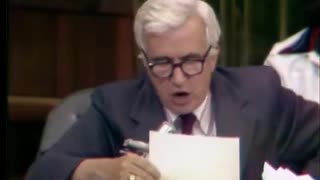 3:50:14
3:50:14
The Memory Hole
18 days agoNixon Impeachment Hearings Day 2 (1974-07-24)
501 -
 LIVE
LIVE
vivafrei
4 hours agoD.C. Gulag Jan. 6 Prisoners Release Watch!
5,213 watching -
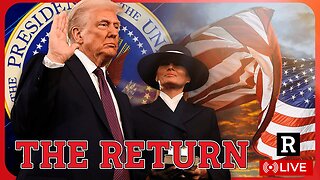 1:49:14
1:49:14
Redacted News
3 hours agoTrump is Back! Congress Uncovers New Biden Crimes One Day After He Leaves D.C. | Redacted
94K121 -
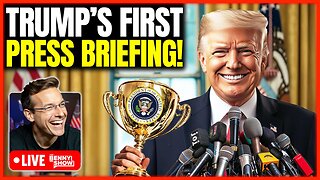 2:09:53
2:09:53
Benny Johnson
3 hours ago🚨President Trump LIVE Right Now Making MASSIVE Announcement At White House News Conference
168K148 -
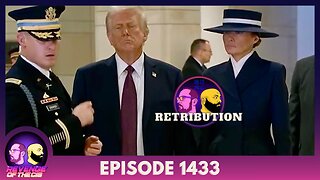 2:04:10
2:04:10
Revenge of the Cis
4 hours agoEpisode 1433: Retribution
44.1K5 -
 1:42:50
1:42:50
The Criminal Connection Podcast
8 hours agoEddie Hearn talks JOSHUA vs FURY, Working With Frank Warren & The Truth About Turki Alalshikh!
4.59K1 -
 1:00:25
1:00:25
In The Litter Box w/ Jewels & Catturd
1 day agoGolden Age | In the Litter Box w/ Jewels & Catturd – Ep. 724 – 1/21/2025
90.2K50 -
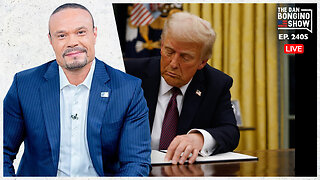 57:42
57:42
The Dan Bongino Show
11 hours agoHE'S BACK! (Ep. 2405) - 01/21/2025
1.21M1.8K -
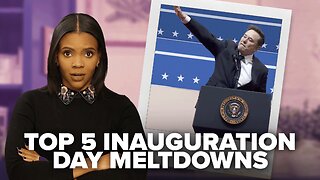 46:19
46:19
Candace Show Podcast
5 hours agoUH-OH! Elon’s Viral Salute Steals The Inauguration Show | Candace Ep 136
109K227 -
 8:05:01
8:05:01
hambinooo
9 hours agoNO COMMIE TUESDAY
76.5K3